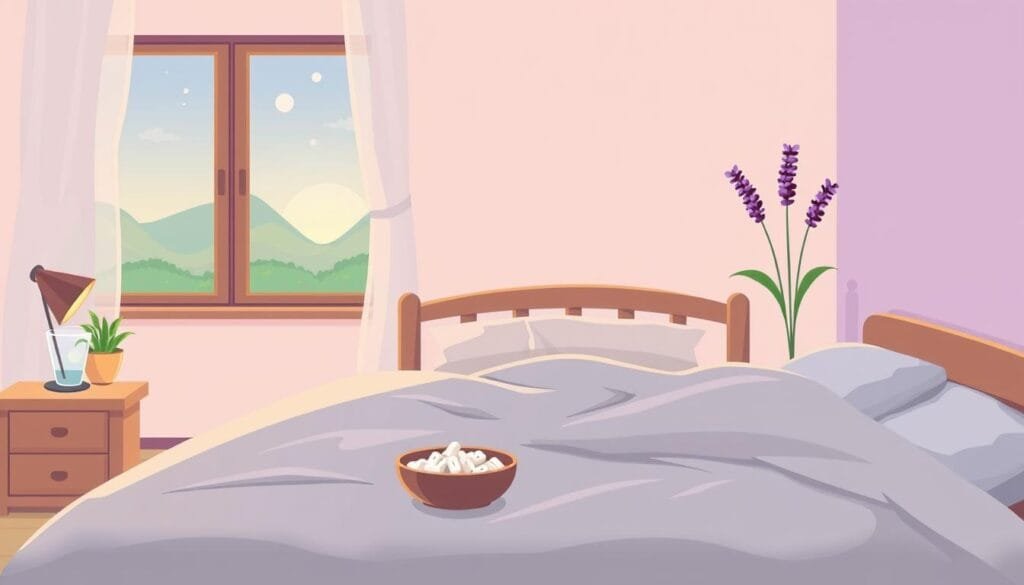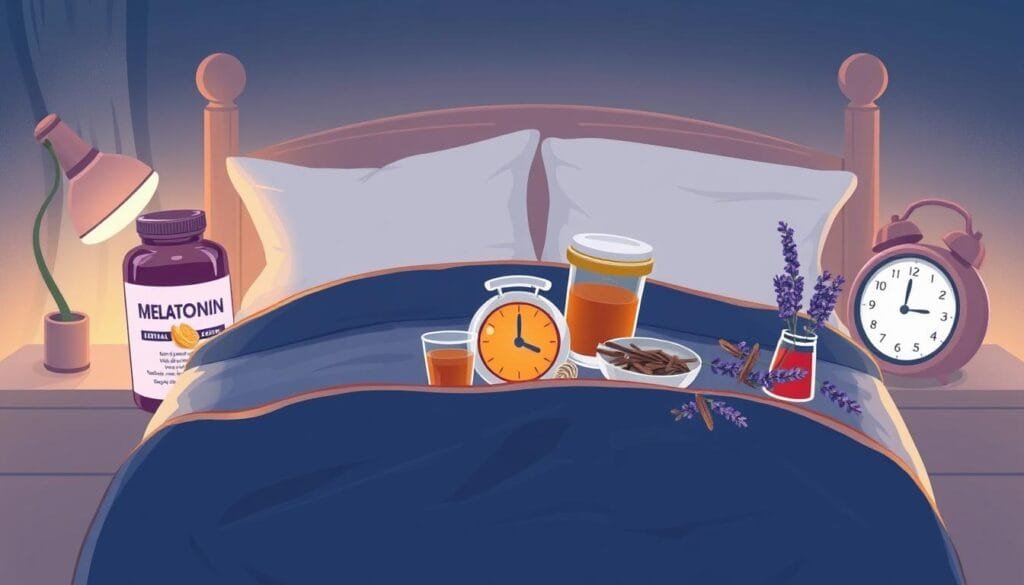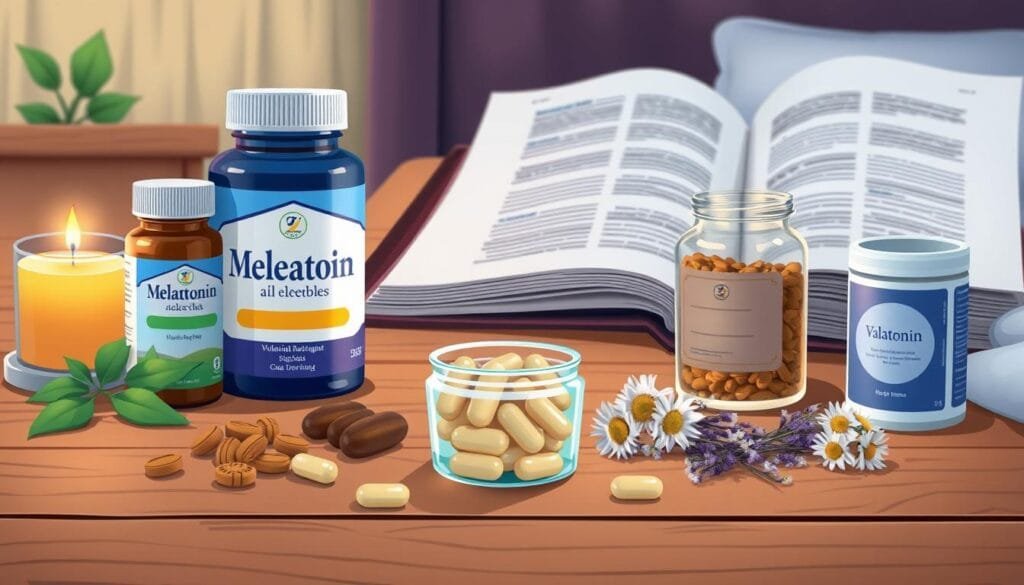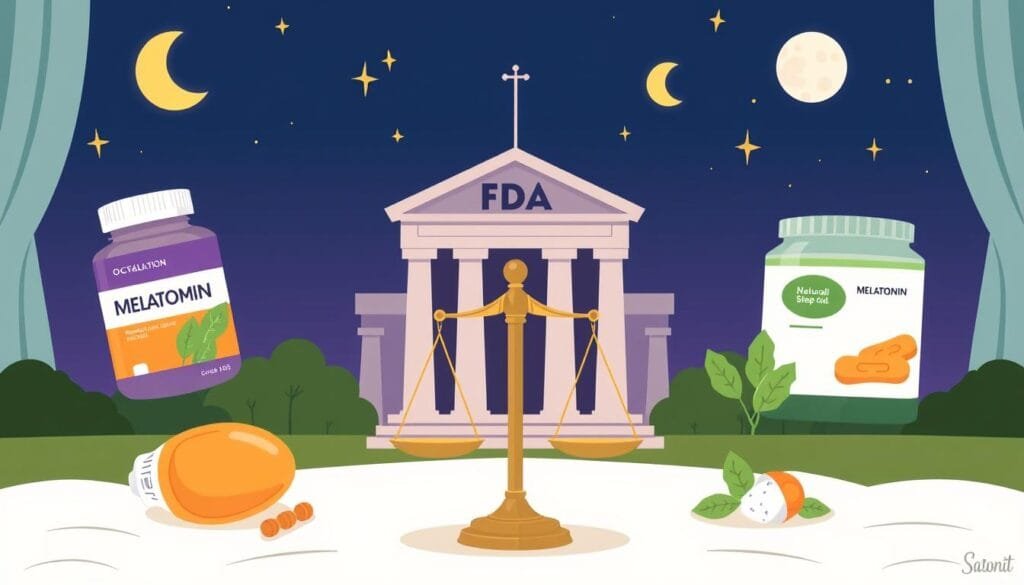As the day ends and the sun sets, your eyelids grow heavy. But instead of sleeping, you lie awake, watching the clock. This is common. About 35% of adults in the U.S. sleep less than seven hours a night. Up to 70 million struggle with sleep issues.
Many seek relief in sleep supplements, both man-made and natural. Melatonin, a hormone our bodies make, is popular. Its sales have soared. But there are many natural sleep aids, like herbal teas and essential oils. So, is melatonin or natural sleep aids better?
Key Takeaways
- Melatonin is a hormone that plays a key role in regulating the sleep-wake cycle, while natural sleep aids encompass a variety of herbal, mineral, and amino acid supplements.
- Both melatonin and natural sleep aids have been shown to offer potential benefits for improving sleep quality, but their effectiveness can vary based on individual factors.
- Melatonin supplements are generally considered safe, but higher doses may cause side effects. Natural sleep aids like valerian root, lavender, and chamomile may also be effective but require more research.
- Consulting with a healthcare provider is recommended for those experiencing chronic or persistent sleep difficulties, as they can help determine the best course of action.
- Maintaining good sleep hygiene, such as establishing a consistent sleep routine and creating a relaxing sleep environment, can also play a crucial role in improving sleep quality.
Understanding Natural Sleep Aids
Natural sleep aids are supplements you can buy without a prescription. They help you fall asleep or stay asleep. These aids often come from plants, vitamins, or minerals we already have in our bodies. Many people choose them because they have fewer side effects than prescription drugs.
What Are the Best Natural Sleep Aids?
Some top natural sleep aids include:
- Magnesium for sleep
- Valerian root
- Chamomile tea
- Lavender essential oil
Research shows these aids can help you fall asleep faster and sleep better. For instance, magnesium might help older adults with insomnia. Taking up to 30 grams of glycine daily seems safe.
Are Natural Sleep Aids Safe?
Even though they’re natural, not everyone can use them safely. Some natural sleep aids, like valerian, might not work well with certain medicines. Always talk to a doctor before trying any sleep supplements.
In short, natural sleep aids can be a good choice for better sleep. But, it’s key to know their benefits and risks. Always check with your doctor, especially if you have health issues or take other medicines.
Melatonin: The Popular Sleep Hormone
Melatonin is a hormone made by the pineal gland. It helps control our sleep and wake cycles. Many people use melatonin supplements to help them sleep better.
Benefits and Potential Side Effects of Melatonin
Melatonin supplements can help you fall asleep faster. Almost two-thirds of American adults have tried them. The usual dose is 1 to 3 milligrams, taken two hours before bed.
While melatonin is usually safe, it can cause side effects. These include feeling tired during the day, headaches, and dizziness. Always talk to a doctor before starting melatonin, especially if you’re on other medications.
Melatonin is great for people with sleep disorders. It helps those with non-24-hour sleep-wake rhythm disorder and delayed sleep-wake phase disorder. It can also help shift workers sleep better during the day.
Melatonin is not just for insomnia. It’s often used with other treatments. But, be careful with children. Accidental overdoses are a growing concern. For most adults, melatonin is safe for short-term use. However, more research is needed for long-term effects.
Cannabinoids: The Cannabis-Derived Sleep Promoters
More states are legalizing cannabis, sparking interest in its sleep benefits. The cannabis plant has compounds called cannabinoids. These include THC and CBD, which some studies say can improve sleep quality. But, the effects can differ based on the product and dosage, and they might not be safe for everyone.
Research on cannabinoids and sleep is ongoing. Yet, some studies have shown promising results:
- A study by Nicholson et al. (2004) found that Delta-9-tetrahydrocannabinol (THC) and cannabidiol (CBD) had an effect on both nocturnal sleep and early-morning behavior in young adults.
- Pivik et al. (1972) conducted research on the effects of Delta-9-tetrahydrocannabinol and synhexl on human sleep patterns.
- Wallach and Gershon (1973) studied the effects of delta8-THC on the EEG, reticular multiple unit activity, and sleep of cats.
- Adams and Barratt (1973) examined the chronic use of marijuana and its impact on the sleep-wakefulness cycles in cats.
The effects of cannabinoids for sleep, like CBD for insomnia and THC for sleep, can vary. This depends on dosage, product type, and individual biology. Cannabis-derived sleep aids might not be for everyone. Always talk to a healthcare professional before trying them.
“Preliminary research indicates CBD may help with various sleep disorders, including insomnia, but more research is needed.”
As cannabis-derived sleep aids evolve, staying updated is key. Knowing the benefits and risks helps make informed choices. This way, individuals can decide if these natural sleep aids are right for them.
Magnesium: A Mineral for Better Sleep
Struggling with insomnia or poor sleep quality? Adding more magnesium to your diet might help. This essential mineral helps regulate sleep and promotes relaxation.
Magnesium is key in many body processes, like making melatonin. This hormone controls our sleep cycles. Research shows magnesium affects sleep quality and amount. Most get enough magnesium from food, but some take supplements, especially older adults with insomnia.
Magnesium supplements are usually safe, but some might get diarrhea. People with kidney disease should talk to their doctor before taking them. The safe dose is about 350 milligrams a day or less.
Find magnesium in foods like spinach, peanut butter, and almonds. Eggs, milk, some yogurts, kidney beans, bananas, and bran flakes are also good sources. Eating protein and carbs together, like sugar-free yogurt with almonds or peanut butter, can also help sleep.
Having trouble sleeping? Try eating more magnesium-rich foods or talk to your doctor about supplements. With the right amount of magnesium, you might sleep better and feel healthier.
“Magnesium supplements can potentially help with falling asleep, particularly for individuals with a magnesium deficiency or poor dietary intake.”
L-Theanine: The Relaxing Amino Acid from Tea
Looking for a natural way to sleep better? L-theanine might be what you need. It’s found in green tea, black tea, and some mushrooms. Studies show it could help you sleep better.
L-theanine can make you feel less stressed and anxious. This can help you relax, which is good for sleep. A 2018 study found that taking 450-900mg of l-theanine daily for 8 weeks improved sleep satisfaction in people with anxiety.
L-theanine doesn’t make you feel sleepy during the day. In fact, it can help you focus better when combined with caffeine. So, if you have trouble sleeping, l-theanine could be a good choice.
| Benefit | Supporting Research |
|---|---|
| Improved mental focus and attention | A 2012 study found that participants who took 100mg of l-theanine made fewer errors in an attention task compared to the placebo group. |
| Enhanced sleep quality | A 2018 study showed that taking 450-900mg of l-theanine daily for 8 weeks led to greater reported sleep satisfaction in participants with generalized anxiety disorder. |
| Reduced stress and relaxation | L-theanine in green or black tea may contribute to relaxation by reducing resting heart rate. |
| Potential weight loss support | As part of a calorie-controlled diet, replacing a snack with green tea could aid in weight loss due to l-theanine creating umami flavor that reduces appetite. |
Want to try l-theanine for better sleep? Remember, the FDA says it’s safe. But, pregnant or breastfeeding women should not take it. Always talk to your doctor before trying new supplements.
Glycine: An Amino Acid for Circadian Rhythm Support
If you’re having trouble sleeping or want to improve your sleep, think about glycine supplements for sleep. Glycine is an amino acid that helps control your body’s internal clock. This clock, or circadian rhythm, affects when you sleep and wake.
How Glycine Supports Sleep
Studies show that a small dose of glycine before bed can make sleep better. It also reduces daytime tiredness in people with glycine for insomnia. Here’s how glycine helps you sleep well:
- Glycine helps your body temperature drop, which is key for falling and staying asleep.
- Glycine and circadian rhythms are closely linked. Glycine helps keep your internal clock in sync, leading to better sleep patterns.
- Glycine stops orexin neurons from keeping you awake. This leads to more non-REM sleep.
- It can also help with sudden sleep problems caused by stress or environment.
| Glycine Benefit | Supporting Evidence |
|---|---|
| Induces non-REM sleep | Oral administration of glycine induced non-rapid eye movement (REM) sleep and shortened NREM sleep latency in rats. |
| Promotes vasodilation and heat loss | Glycine elevated cutaneous blood flow (CBF) at the plantar surface in a dose-dependent manner, resulting in heat loss. |
| Acts on the suprachiasmatic nucleus (SCN) | Exogenous glycine promotes sleep via peripheral vasodilatation through the activation of NMDA receptors in the SCN shell. |
| Improves sleep quality and daytime alertness | Low-dose glycine at 3g/day before bedtime improves sleep quality and reduces sleepiness and fatigue. |
If you’re thinking about glycine supplements for sleep, talk to a healthcare professional first. They can help you decide if it’s right for you and what dose to take. With their advice, glycine could be a natural way to help your sleep and circadian rhythms.
Valerian Root: An Herbal Sleep Aid
If you’re looking for a natural way to sleep better, valerian root is worth a try. This herbal supplement comes from the valerian plant’s roots and stems. It has been helping people sleep well for centuries.
Studies show that 300 to 600 milligrams of valerian root before bed can help you fall asleep faster. A 2006 review found it improves sleep quality with few side effects.
Valerian root is safer than many sleep medicines. It has mild side effects like headaches or uneasiness in a few people. This makes it a good choice for those wanting a natural sleep aid.
“Valerian root has earned a reputation as a natural stress medication, alleviating anxiety symptoms that inhibit sleep, and promoting a feeling of relaxation.”
The exact way valerian root works is still a mystery. But it’s thought to affect the body’s neurotransmitters. This helps release chemicals that might be keeping you awake.
Before trying valerian root supplements, talk to your doctor. They can interact with other medicines or supplements. Pregnant or nursing women should avoid it. Your doctor can help make sure valerian root is safe for you.
In summary, valerian root is a natural sleep aid with a long history. It has few side effects and can help with insomnia. It’s a good option for those looking for a natural way to sleep better.
melatonin vs. natural sleep aids
Melatonin and natural sleep aids both help with sleep problems. Melatonin is a hormone that regulates sleep and wake cycles. It’s good for jet lag or trouble falling asleep. Natural sleep aids, like herbs and minerals, might tackle insomnia’s root causes and boost sleep quality.
Melatonin has shown to help people with insomnia fall asleep faster. It also helps with jet lag, making you more alert and less sleepy during the day. Older adults might find it especially helpful because they often have lower melatonin levels.
Natural sleep aids have their own benefits. Valerian is safe for a few weeks but might cause headaches. Chamomile is popular but lacks solid proof it helps with insomnia. Kava is not safe because it can harm the liver. Tryptophan and 5-HTP might affect sleep, but there’s not enough evidence for insomnia.
| Supplement | Potential Benefits | Potential Drawbacks |
|---|---|---|
| Melatonin |
|
|
| Valerian |
|
|
| Chamomile |
|
|
| Kava |
|
|
| Tryptophan and 5-HTP |
|
|
In conclusion, both melatonin and natural sleep aids have their pros and cons. The right choice depends on your specific sleep issues and needs. Talking to a healthcare professional can help find the best solution for better sleep and overall health.
When to Use Over-the-Counter Sleep Aids
Over-the-counter (OTC) sleep aids are meant for short-term use, not for long-term sleep issues. They can help with short-term stress or jet lag. But, they’re not good for ongoing insomnia or other sleep problems.
Using sleep aids too often can make you dependent on them. Stopping them can cause a rebound effect. Always talk to a healthcare provider if you have ongoing sleep troubles.
Common OTC sleep aids include antihistamines like Diphenhydramine (found in Nytol, Sominex, Sleepinal, Compoz) and Doxylamine (in Unisom, Nighttime Sleep Aid). These can make you feel drowsy the next day, dizzy, and dry your mouth.
Natural supplements like melatonin, valerian, and CBD are also available without a prescription. Melatonin helps with jet lag and shift work sleep issues. Valerian aids in insomnia and anxiety. CBD is studied for anxiety relief, which can help with sleep disorders.
But, supplements like melatonin, valerian, and CBD are not as closely watched by the FDA as other drugs. This means there’s a risk of inaccurate labels and possible interactions with other medicines.
If your sleep issues last more than a week, see a doctor. They can check for underlying problems like sleep apnea, stress, or anxiety. Relying on over-the-counter sleep aids for the long-term can lead to dependence and adverse effects.
Comparing Antihistamine and Natural Sleep Supplements
Looking for a good night’s sleep? You have many choices. Antihistamine sleep aids like diphenhydramine can make you sleepy. But, they might make you feel groggy in the morning and cause insomnia later.
Natural sleep supplements, like valerian root and lavender essential oil, might be a softer choice. But, their proof of working is not as strong as regular sleep meds.
Antihistamine Sleep Aids
Antihistamines block histamine, a brain chemical that keeps you awake. They can make you sleep, but might also cause dry mouth and constipation. Always use them carefully and with a doctor’s advice.
Other Natural Sleep Remedies
- Valerian root is called “nature’s Valium” and helps sleep by stopping GABA breakdown, a chemical linked to sleep and anxiety.
- Lavender essential oil calms the nervous system, helping you relax and sleep better.
- Herbal teas, like chamomile, have compounds that might make you sleepy and help you sleep better.
Before trying any sleep aid, research its good and bad sides. Talk to a doctor first, as natural supplements can be different in how well they work and how safe they are.
| Sleep Aid | Potential Benefits | Potential Drawbacks |
|---|---|---|
| Antihistamine Sleep Aids | Can help induce drowsiness and facilitate falling asleep | May cause morning grogginess, dry mouth, and constipation |
| Valerian Root | Helps promote sleep by inhibiting the breakdown of GABA | Evidence for effectiveness is mixed, and it may interact with certain medications |
| Lavender Essential Oil | Has a calming effect on the nervous system, aiding relaxation and sleep quality | Should be used in moderation as high doses may have adverse effects |
| Herbal Teas (e.g., Chamomile, Passionflower) | Contain compounds that may help induce drowsiness and support better sleep | Effectiveness can vary, and some herbs may interact with medications |
Finding the right sleep aid is all about what works best for you. Always talk to a doctor to find the best option. Use any sleep aid responsibly and as directed.
Addressing Chronic Sleep Issues
If you’re dealing with long-term sleep problems, getting professional help is key. Using over-the-counter sleep aids like melatonin or natural supplements isn’t a lasting fix for chronic insomnia. You should talk to a primary care doctor or a sleep specialist for better treatment options.
Sleep specialists might give you a stronger sleep aid or send you to a sleep psychologist for cognitive behavioral therapy (CBT). CBT is a top choice for long-term insomnia treatment. It tackles the psychological and behavioral reasons behind your sleep issues.
Changing your lifestyle can also help your sleep. Here are some tips:
- Keep your sleeping area quiet and dark
- Don’t eat big meals or drink caffeine before bed
- Do exercise during the day, not before bed
- Try relaxation techniques like meditation at night
By teaming up with a sleep specialist and making these lifestyle changes, you can tackle your chronic sleep problems. This will boost your health and well-being in the long run.
| Sleep Specialist Recommendations | Potential Benefits |
|---|---|
| Prescription sleep aids | Improve sleep quality and duration |
| Cognitive Behavioral Therapy (CBT) | Address underlying psychological factors for chronic insomnia |
| Lifestyle changes | Promote better sleep hygiene and overall sleep quality |
“Addressing chronic sleep issues often requires a multifaceted approach, including medical treatment and lifestyle modifications. Working with a sleep specialist is the best way to find long-term solutions for persistent insomnia.”
Regulating Sleep Aids: The FDA’s Role
The U.S. Food and Drug Administration (FDA) plays a key role in regulating sleep aids. Natural sleep aids, like melatonin, are seen as dietary supplements. This means they face less strict rules than prescription drugs.
The FDA’s watch over dietary supplements is not as tight as it is for medicines. Before hitting the shelves, these products don’t get the FDA’s thumbs up on safety, effectiveness, or labeling. This can cause big differences in what you get from one brand to another.
- A study found that the actual melatonin content in supplements can vary widely, ranging from -83% to +478% of the labeled content.
- Approximately 61% to 78% of melatonin binds to albumin in the body, affecting its distribution and bioavailability.
- The elimination half-life of melatonin is relatively short, typically ranging from 1 to 2 hours, with variations based on the formulation used.
Because the FDA doesn’t watch over natural sleep aids as closely, it’s smart to be careful with over-the-counter sleep supplements. The quality and safety of these products can vary a lot. This might lead to unexpected side effects or problems.
“The FDA’s lack of oversight on dietary supplements raises concerns about the safety and efficacy of natural sleep aids, leaving consumers to navigate the market with limited guidance.”
As more people turn to over-the-counter sleep aids and dietary supplements, we need better rules and clear information. It’s important for people to know the risks and limits of natural sleep aids. They should talk to doctors before using them.
Sleep Hygiene: Non-Supplement Strategies for Better Sleep
Sleep aids, natural or not, are not a long-term fix for sleep problems. Good sleep hygiene tips are key to better sleep without non-medication sleep solutions.
Keeping a regular sleep schedule is a top natural way to improve sleep. Try to go to bed and wake up at the same time every day. This helps your body’s clock and improves sleep.
A calming bedtime routine can greatly help your sleep. Try reading, light stretching, or a warm bath before bed. Stay away from TV and electronic devices at night, as they can mess with your sleep cycle.
Stress management, like meditation or deep breathing, can also help you relax and sleep better. Lowering stress and anxiety is crucial for quality sleep without supplements or meds.
Good sleep hygiene is a lifestyle choice that needs commitment. By adding these non-supplement strategies to your routine, you can enhance your sleep and well-being without artificial aids.
“Sleep is the best meditation.” – Dalai Lama
| Sleep Hygiene Tip | Benefit |
|---|---|
| Maintain a consistent sleep schedule | Regulates the body’s internal clock for better sleep |
| Create a relaxing bedtime routine | Promotes better sleep by reducing stress and anxiety |
| Avoid stimulating activities before bed | Prevents disruption of the natural sleep-wake cycle |
| Practice stress management techniques | Helps you unwind and fall asleep more easily |
By adding these non-medication sleep solutions to your daily life, you can boost your sleep quality and well-being. Good sleep hygiene is a choice that needs dedication, but the rewards are worth it.
Conclusion
Melatonin and natural sleep aids can help with sleep problems. But they work differently and suit various issues. Melatonin helps with sleep-wake cycles, great for jet lag or falling asleep.
Natural sleep aids, like herbs and minerals, tackle insomnia’s root causes. They improve sleep quality. It’s key to use them wisely and talk to a doctor first.
Good sleep habits are crucial, whether using melatonin or natural aids. Keep a regular sleep schedule and have a calming bedtime routine. This is the best way to improve sleep long-term.
In short, melatonin and natural sleep aids each have their role. The right choice depends on your needs. By knowing the differences and consulting your doctor, you can find the best sleep solution for you.
FAQ
What are the different types of natural sleep aids?
Are natural sleep aids safe?
How does melatonin work for sleep?
Can cannabinoids like CBD and THC help with sleep?
How does magnesium benefit sleep?
What are the benefits of L-theanine for sleep?
How does glycine support sleep?
Is valerian root an effective natural sleep aid?
When is it appropriate to use over-the-counter sleep aids?
How do antihistamine and natural sleep supplements compare?
When should I see a healthcare provider for persistent sleep issues?
How are natural sleep aids regulated by the FDA?
Source Links
- Skip The Melatonin – These Are Your Best Sleep Aid Options – https://www.henryford.com/blog/2022/07/skip-the-melatonin-these-are-your-best-sleep-aid-options
- Natural Sleep Aids to Help You Get More Zzz’s – https://www.healthline.com/nutrition/sleep-aids
- Natural Sleep Aids: Which Are the Most Effective? – https://www.sleepfoundation.org/sleep-aids/natural-sleep-aids
- Your guide to nonprescription sleep aids – https://www.mayoclinic.org/healthy-lifestyle/adult-health/in-depth/sleep-aids/art-20047860
- Melatonin for Sleep: Does It Work? – https://www.hopkinsmedicine.org/health/wellness-and-prevention/melatonin-for-sleep-does-it-work
- Melatonin: Usage, Side Effects, and Safety – https://www.sleepfoundation.org/melatonin
- Is CBD a Safe and Effective Sleep Aid? – https://www.sleepfoundation.org/sleep-aids/cbd-for-sleep
- Effects of Cannabinoids on Sleep and their Therapeutic Potential for Sleep Disorders – https://www.ncbi.nlm.nih.gov/pmc/articles/PMC8116407/
- Cannabinoids, Endocannabinoids and Sleep – https://www.ncbi.nlm.nih.gov/pmc/articles/PMC7388834/
- Melatonin is a better sleep aid than magnesium, expert says—but neither supplement is a cure-all – https://www.cnbc.com/2024/02/11/melatonin-vs-magnesium-which-supplement-is-better-for-sleep.html
- Using Magnesium for Better Sleep – https://www.sleepfoundation.org/magnesium
- L-theanine: Benefits, risks, sources, and dosage – https://www.medicalnewstoday.com/articles/324120
- Natural Sleep Aids: Which Ones Really Improve Sleep? | hims – https://www.forhims.co.uk/blog/natural-sleep-aids
- The Sleep-Promoting and Hypothermic Effects of Glycine are Mediated by NMDA Receptors in the Suprachiasmatic Nucleus – https://www.ncbi.nlm.nih.gov/pmc/articles/PMC4397399/
- Glycine for Sleep | Sleep Foundation – https://www.sleepfoundation.org/sleep-aids/glycine-for-sleep
- Sleep aids: Over-the-counter and prescription – https://www.medicalnewstoday.com/articles/325768
- Valerian root vs. melatonin: Differences, and how do they help? – https://www.medicalnewstoday.com/articles/valerian-root-vs-melatonin
- Melatonin vs. Valerian Root – Comparison For a Good Night’s Rest – https://www.mdbiowellness.com/blogs/doctors-desk/melatonin-vs-valerian-root-comparison-for-a-good-nights-rest
- Melatonin – https://www.mayoclinic.org/drugs-supplements-melatonin/art-20363071
- Natural Sleep Aids and Remedies – https://www.webmd.com/women/natural-sleep-remedies
- Experts: Don’t Mistake Melatonin for a ‘Natural’ Sleeping Pill – https://www.verywellhealth.com/melatonin-overuse-5443080
- What You Should Know About OTC Sleep Aids for Insomnia – https://www.webmd.com/sleep-disorders/sleeping-pills-prescription-otc
- Sleeping Pills and Natural Sleep Aids – HelpGuide.org – https://www.helpguide.org/wellness/sleep/sleeping-pills-and-natural-sleep-aids
- Sleep aids: Natural vs. over-the-counter vs. prescription pills – https://www.cnet.com/health/sleep/sleep-aids-natural-vs-over-the-counter-vs-prescription-pills/
- Best Sleep Aids: Prescription vs. Over-the-Counter – https://www.buzzrx.com/blog/best-sleep-aids-prescription-vs-over-the-counter
- Natural Good Sleep: Tips on Melatonin, Valerian, and More – https://www.webmd.com/diet/features/natural-good-sleep-tips-on-melatonin-valerian
- Use of melatonin supplements rising among adults – https://www.nih.gov/news-events/nih-research-matters/use-melatonin-supplements-rising-among-adults
- Melatonin as a Sleep Aid: What You Should Know – https://www.lifespan.org/lifespan-living/melatonin-sleep-aid-what-you-should-know
- Melatonin – StatPearls – NCBI Bookshelf – https://www.ncbi.nlm.nih.gov/books/NBK534823/
- Sleep Aids: Know the Types, Benefits, & Risks – https://www.sleepfoundation.org/sleep-aids
- Compare Sleep Aids – https://www.sleepfoundation.org/sleep-aids/compare-sleep-medications
- Natural Ways to Get Better Sleep – https://www.ncoa.org/adviser/sleep/natural-sleep-remedies/
- Natural Sleep Aids: Valerian, Melatonin, and More – https://www.healthline.com/health/healthy-sleep/natural-sleep-aids
- The effectiveness of melatonin for promoting healthy sleep: a rapid evidence assessment of the literature – https://www.ncbi.nlm.nih.gov/pmc/articles/PMC4273450/
- Melatonin Natural Health Products and Supplements: Presence of Serotonin and Significant Variability of Melatonin Content – https://www.ncbi.nlm.nih.gov/pmc/articles/PMC5263083/
- What You Should Know About Melatonin for Sleep – https://www.healthline.com/nutrition/melatonin-and-sleep









